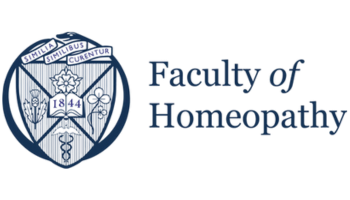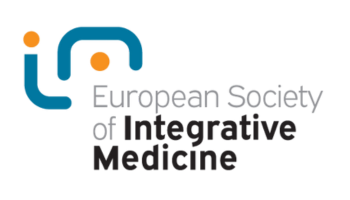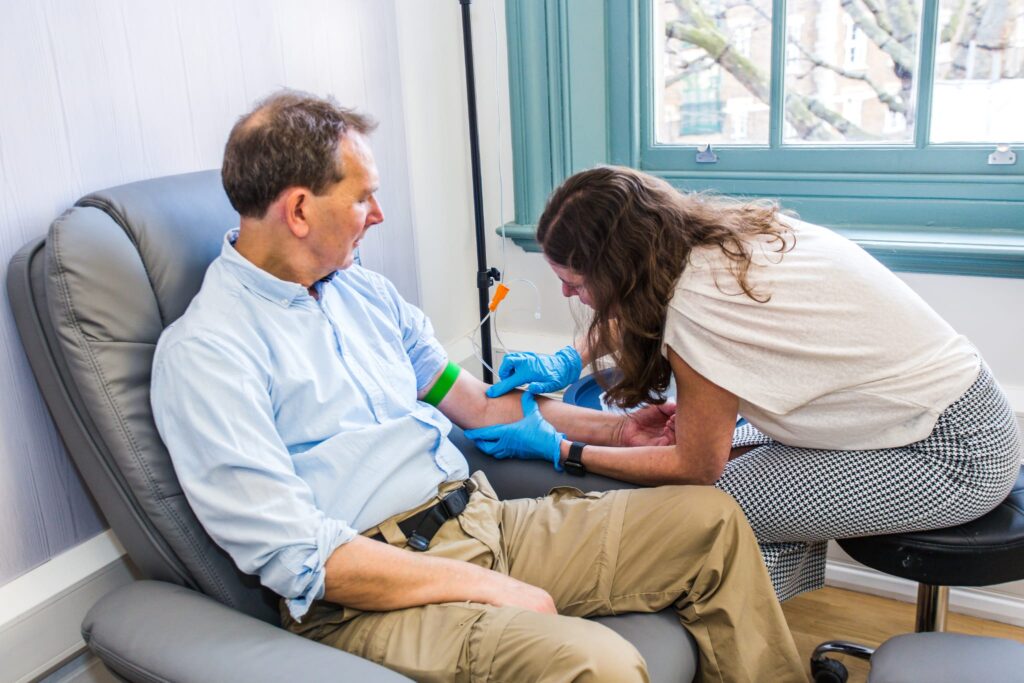Are you based outside of London seeking medical support with a complementary cancer care consultant?

Explore how our vitamin C IV therapy works in conjunction with conventional cancer treatments to improve your overall quality of life.



GMC-Registered Doctors
Research-Backed Protocols
Tailor Designed Approach
Trusted by Thousands

Our Integrative Oncology Clinic has been carefully designed to provide High-Dose Vitamin C therapy specifically for the field of cancer care. As our expertise is focused solely in this area, we are not able to offer this treatment for non-cancer-related conditions.
By dedicating our efforts to one specialty, Wellbeing Medical Group aims to provide the most effective and supportive care for those diagnosed with cancer.
Our IV infusion specialists are highly trained professionals with years of experience delivering safe, effective high-dose vitamin C therapy. We stay up to date with the latest clinical protocols to ensure optimal care and results.
Conveniently located in the heart of London, our clinic is easily accessible by public transport and major roads. We provide a central, discreet setting for premium wellness treatments.
We’ve created a calm, modern space where your comfort and wellbeing come first. From the moment you arrive, our friendly team is here to make you feel relaxed and supported.
We offer flexible scheduling to fit your busy lifestyle. Booking is simple and designed around your convenience.
Vitamin C IV therapy involves a professional administering a high dose of vitamin C through a vein and into your bloodstream. Using a vitamin C IV drip to administer the vitamin C allows for higher concentrations in the body that can’t be achieved with oral intake. Where oral intake can result in just 10% absorption of vitamin C, IV therapy allows for the full 100% to be absorbed, resulting in greater benefits when used in conjunction with conventional cancer treatments.
High dose vitamin C infusion for cancer has shown potential to enhance immune function, improve patient wellbeing, sensitise tumours to chemotherapy and radiation and reduce tumour growth. Tumour growth reduction is particularly effective in tumours that have impaired antioxidant defence mechanisms.

Discover our medical team and explore how High‑Dose Vitamin C can support your health journey. Whether you’re seeking immune support, adjunctive cancer care, or recovery enhancement, our experienced clinicians are here to guide you with evidence-based IV therapy.

Add Team Image
Fiona
Diagnosis: Adenocarcinoma non-small cell lung cancer
Fiona was diagnosed with non-small cell lung cancer with bone metastases. After completing one session of chemotherapy and immunotherapy, she chose to discontinue further treatment due to the side effects she experienced. Fiona’s objective was to supplement her conventional treatment with an integrative approach. To facilitate this, she promptly provided us with her biopsy results for review, allowing us to design a tailored plan of integrative therapies to support her care. Throughout therapies at Wellbeing Medical Group, she received regular scans from her oncologist, who closely monitored her progress and showed great compassion and care. Fiona was able to successfully achieve her goal of maintaining both quality of life and disease stability.
Graeme
Diagnosis: Adenocarcinoma Oesophagus
Graeme first reached out to Wellbeing Medical Group while awaiting his final biopsy results and diagnosis. Determined to explore both NHS and private pathways, he aimed to secure the best outcomes for his upcoming treatments and surgery.
We collaborated closely with Graeme to develop an integrative care plan tailored to his needs, aligning with his NHS treatment strategy. Graeme’s goals included enhancement of his overall well-being, creating an anti-cancer effect and support towards adverse reactions/side effects to hospital treatment pathways.
Isis
Diagnosis: Hodgkin Lymphoma
Isis approached Wellbeing Medical Group upon receiving her cancer diagnosis, with no conventional treatment having yet commenced. Due to the aggressive nature of her condition, she was about to begin a six-month chemotherapy regimen. Isis’ objective was to integrate complementary therapies alongside her chemotherapy, aiming to mitigate side effects and enhance the effectiveness of the chemotherapy. Given the advanced stage of her diagnosis, Wellbeing Medical Group recommended a more aggressive integrative approach. Isis committed to a comprehensive protocol that included the incorporation of additional anti-cancer therapies to maximize her outcomes throughout her chemotherapy journey. Isis also dedicated several months to expanding her knowledge by engaging with a range of academic literature and research materials.
Contact us for a free consultation.
Mon – Fri 9:00am – 6:00pm

High dose vitamin C IV therapy is a key aspect of complementary cancer care. At high doses, vitamin C undergoes a transformation acting as a pro-oxidant. It’s this shift that plays the most crucial role in complementary cancer therapies by enhancing oxidative stress within cancer cells leading to cellular damage and promoting cancer cell death.
Unlike its typical role as an antioxidant, high dose vitamin C IV therapy can selectively target and damage cancer cells, whilst healthy cells remain unaffected.
The effectiveness of IV vitamin C for cancer is largely reliant on achieving a cumulative pro-oxidant effect, so a single dose will not provide you with the desired therapeutic outcomes. For maximum benefit, you should do repeat infusions over a set period as to maintain elevated levels of pro-oxidant activity and get maximum benefits.

When it comes to vitamin C IV therapy within cancer care, the benefits outweigh the risks, as intravenous vitamin C therapy has a very low risk of side effects.
As our patients merge their conventional route path with therapies such as high dose vitamin c, our medical team understands adverse reactions can be a results of treatments such as chemotherapy. All patients are monitored closely and with the use of high dose vitamin c alongside your conventional treatment, adverse reactions can subside over a shirt period of time.
According to a range of scientific research[47], a fully competent immune system is required to maximise the antiproliferative effect of Vitamin C in breast, colorectal, melanoma, and pancreatic tumours. High-dose Vitamin C modulates infiltration of the tumour microenvironment via the cells of the immune system and delays cancer growth in a T cell-dependent manner.
Vitamin C not only enhances the cytotoxic activity of adoptively transferred CD8 T cells but also cooperates with immune checkpoint therapy (ICT) in several cancer types. A combination of this vitamin and ICT can be curative in models of mismatch repair-deficient tumours with a high mutational burden.
More literature [48] indicates that Vitamin C has the potential to be a potent anti-cancer agent when administered intravenously and in high doses (high-dose IVC). Early-phase clinical trials have confirmed the safety and indicated the efficacy of IVC in eradicating tumour cells of various cancer types.
High dose Vitamin C IV therapy has been shown to be safe and well-tolerated in cancer patients and has been scientifically proven to reduce pain and improve quality of life in the palliative care setting.
In palliative care, high dose vitamin C IV therapy is currently gaining ground due to its highly safe and tolerable profile. Not only is high dose IV vitamin C therapy known to relieve pain in cancer patients [6], vast clinical evidence suggests that it has a significant positive impact on patients’ well-being [1, 2-5, 7-10]. This might be due to the frequent hypovitaminosis and Vitamin C deficiency in cancer patients [6, 11, 12], which are commonly enhanced by anti-neo-plastic treatments [3].
Research has shown that patients with radiotherapy-resistant bone metastasis have less pain and better performance measures when given high dose vitamin C IV therapy. Patients also had a median survival time of 10 months as compared to the 2-month median survival time within the control group [7].
Overall, high dose vitamin C IV therapy administered as a single agent has not only been shown to be safe and well-tolerated in cancer patients but also to alleviate pain and to improve quality of life in the palliative care setting.
At Wellbeing Medical Group, we have specifically designed our high dose vitamin C IV therapy with the health of our patients in mind. We work alongside our patients to tailor your dosage to meet your unique medical needs and provide you with consistent support from start to finish.
Your comfort is our top priority, and we pride ourselves on having a calming environment during your therapy. We will help you relieve pain and manage the symptoms of cancer treatment using a range of complementary therapies administered by our expert cancer care consultants.
Contact our team today to find out more about how our high dose vitamin C IV therapy can help you and to book a consultation with our cancer care team.
High dose vitamin C IV therapy works in a number of ways, and it can be incredibly beneficial when used alongside conventional cancer treatments. When you come to Wellbeing Medical Group for vitamin C IV therapy, you will work with one of our expert medical teams to receive a tailored vitamin C dosage to support your unique needs.
Whilst the exact anticancer mechanisms of IV vitamin C for cancer aren’t fully understood just yet, there have been a number of proposed mechanisms of action. These are some of the mechanisms of action for high dose vitamin C IV therapy in regards to cancer care.
Pro-oxidant Effects on Cancer Cells:
At high doses, Vitamin C transforms into a pro-oxidant, inducing oxidative stress by producing hydrogen peroxide within the tumour microenvironment. This oxidative damage is selectively more toxic to cancer cells than to healthy cells, which are better equipped to neutralise free radicals. This effect disrupts cancer cell metabolism and leads to cellular damage, including DNA fragmentation and mitochondrial dysfunction, which can trigger apoptosis (programmed cell death).
Sensitisation of Tumour Cells:
Vitamin C IV infusion has been shown to sensitise tumour cells to conventional cancer treatments such as chemotherapy and radiation therapy. By increasing oxidative stress in cancer cells, Vitamin C can enhance the cytotoxicity of these treatments, making them more effective while potentially reducing the risk of tumour resistance.
Immune System Support:
Vitamin C plays a critical role in immune function, supporting the production and activity of immune cells like T-cells, natural killer (NK) cells, and macrophages. High-dose Vitamin C IV infusions may enhance the body’s natural defence mechanisms against cancer and infections, improving patient outcomes, particularly during periods of immune suppression caused by cancer treatments.
Cumulative Effect and Repeat Dosing:
The effectiveness of high-dose Vitamin C IV infusion therapy is significantly enhanced when administered over a period of time. Cumulative dosing is essential to maintain elevated pro-oxidant levels in the body, ensuring sustained therapeutic effects. Vitamin C pro-oxidant action is most effective when levels are consistently elevated, making repeat dosing critical for optimal results.
Are you based outside of London seeking medical support with a complementary cancer care consultant?
There are a number of reasons individuals choose vitamin C IV administration rather than other mechanisms. Some of the benefits of choosing vitamin C IV therapy include:
Precise Dosing:
IV administration allows for precise dosing, which is crucial for achieving therapeutic effects while minimising potential side effects. Healthcare providers can adjust doses based on the patient’s specific needs and response to treatment.
Adjunct to Other Cancer Treatments:
Our IV infusion therapies can be used in combination with conventional cancer therapies such as chemotherapy, radiation, and immunotherapy. It has been shown to sensitise cancer cells to these treatments, potentially improving their efficacy and reducing the likelihood of drug resistance.
Higher Bioavailability:
This agent has limited bioavailability when taken orally due to its rapid metabolism and low absorption. IV infusion bypasses the digestive system, ensuring that higher concentrations of DCA are delivered directly into the bloodstream, leading to more effective therapeutic outcomes.
Faster Onset of Action:
Intravenous infusion provides rapid systemic distribution, allowing for quicker onset of therapeutic effects. This can be especially beneficial in patients undergoing active cancer treatment, where immediate metabolic reprogramming and enhanced tumour suppression are critical.
At Wellbeing Medical Group, we have specifically designed our vitamin C IV therapies with the health of our patients in mind. We work alongside you and your oncologist to tailor your dosage to meet your unique needs and provide you with consistent support from start to finish.
We make your comfort our top priority and we pride ourselves on having a calming environment during your vitamin C IV infusion. Contact our expert medical team today to find out more about how our high dose vitamin C IV therapy can help you.
We work alongside your cancer care team to ensure that our vitamin C IV infusions are working in conjunction with your conventional cancer treatments.
When it comes to vitamin C IV therapy, our team at Wellbeing Medical Group strongly believes the benefits outweigh the risks. However, there are a few unique situations where high dose vitamin C IV therapy is not recommended. This would be concluded by our lead medical consultant.
Our team of medical members can work alongside your cancer care team to discuss the possible risks and side effects before starting your vitamin C IV therapy. We check your complete medical history and the conventional cancer treatments you’re undergoing before embarking on any complementary therapies.

Wmg is home to the latest cutting edge medical technology and advances in multidisciplinary care. Our concept is simple we believe that complementary therapy is the key to prosperous health.
Services
Visit Us
Contact Us
© Copyright 2021-2026 Wellbeing Medical Group Ltd. All Rights Reserved.